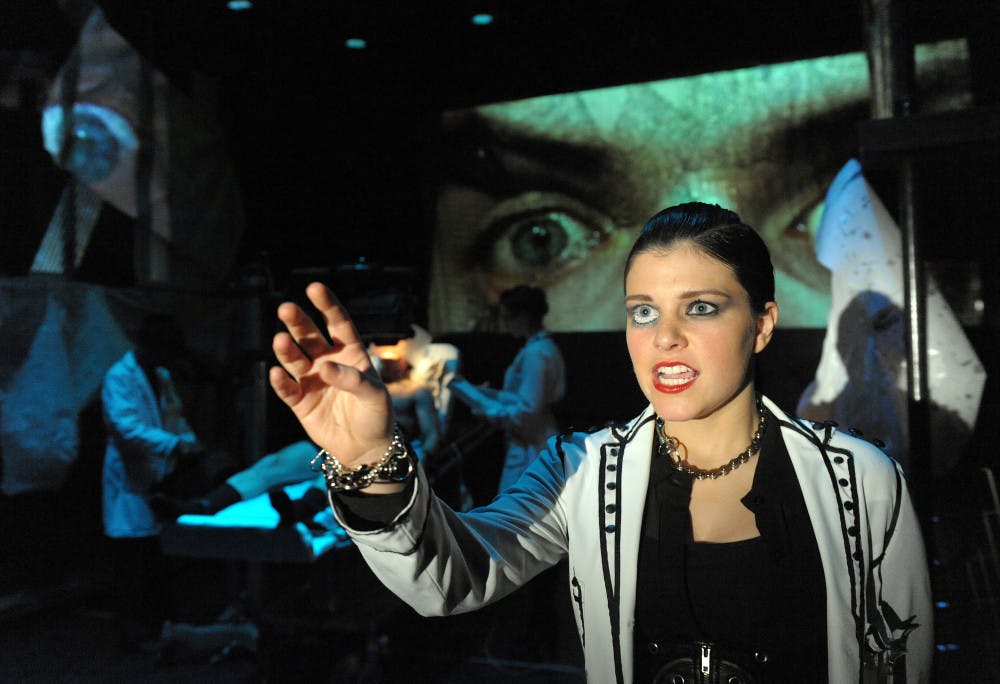On April 10-12, the Middlebury Theatre and Dance departments presented A Clockwork Orange in Wright Memorial Theater. The play was directed by Visiting Assistant Professor of Theatre Andrew Smith ’97.5 and starred over twenty Middlebury students. Adam Milano ’15 led the cast as anti-hero Alex, a ruthless teenager who torments innocents with a band of fellow troublemakers, or Droogs. The play is adapted from Anthony Burgess’ highly acclaimed 1962 novella of the same name and ultimately explores the question of whether it is better to choose to be bad or be forced to be good.
Although Stanley Kubrick’s 1971 film adaptation of A Clockwork Orange is perhaps the best known version of the work, it presents Alex as purely diabolical. In the play, Alex is slightly more nuanced, with a morality that is somewhat restored at the close of the curtain. He also pairs down some of the violence and sexual assault so prominently featured in Kubrick’s film.
“The original book had a 21st chapter … in which Alex gets this redemptive ending,” Smith explained. “The American editors thought that readers preferred darker characters so they just cut that 21st chapter out. The movie was made off of that American edition.” In many ways, then, the play is Burgess’ attempt to reclaim and rectify the original meaning of his story.
Smith and his actors approached the play with sensitivity because although it is less intense than the movie, it is still inherently violent and disturbing.
“A lot of the actions Alex does are awful and irreprehensible … I wanted to make sure that in all these violent scenes … that there was a trust and respect in the cast,” Milano said. He also noted, however, that the darkness of the play — and of his character in particular — offered a unique opportunity to explore his range as an actor.
“What didn’t draw me to this role?,” Milano said. “This role gives you utter freedom because [Alex] just does so many things without forgiveness so it really gives you the opportunity on stage to play and have fun.”
In preparing to play Alex, who is wild, detestable and, at times, charming, Milano drew inspiration from a variety of pop icons. He studied Queen front man Freddie Mercury and alternative heavy metal rocker Marilyn Manson in particular, but also looked to pop punk bands like Blink 182 and Green Day and to the 1988 movie Dangerous Liaisons for material. Shannon Fiedler ’14 similarly drew inspiration from a range of sources to play Alex’s corrupt doctor, Dr. Brodsky. Her performance was influenced in part by Kevin Spacey’s role as a serial killer in the movie Se7en, Heath Ledger’s interpretation of the Joker in The Dark Knight, and Anthony Hopkins’ Hannibal Lecter from Silence of the Lambs.
In addition to the independent work required of lead actors like Milano and Fiedler, the entire cast rehearsed together for an average of four hours a day, six days a week for nine weeks. This regular schedule quickly brought students together.
“The rehearsal process was highly collaborative and the play really has an ensemble feeling,” Fielder explained.
Although unifying, rehearsals also proved demanding, especially for Milano, who was on stage for the entire play.
“I would say the most challenging part would be just the amount of emotion and mental capital that the show takes, even if it’s just four hours of rehearsal a night,” Milano said.
Milano’s dedication to and investment in his role paid off; he played Alex with a masterful depth, nuance, and intentionality, drawing both utter detest and surprising allegiance from the audience. In addition to impressive acting, A Clockwork Orange boasted stunning set design, lighting, and intricately coordinated fight scenes, all of which made for a full sensory experience that was both emotionally and visually engaging.
“This is a play that has it all,” Smith said. “It’s got movement sequences, it’s got fights, it’s got philosophical discussions, it’s got invented language, it’s got lights, music, dancing. It’s also got heart and passion and soul … it’s a very well rounded piece of art.”
Milano and Fiedler praised Smith’s ability to not only coordinate these many aspects of the show, but also empower the actors.
“Andrew [Smith] has been such a great director to work with,” Fielder said. “He was great at fostering a creative environment, making all of us feel like it was our show that we were all putting on together.”
Milano agreed.
“[Smith] did an incredible job with the actors and making sure their voice, their opinion, and their personality mattered,” he said.
Ultimately, Smith hoped the show would offer viewers the opportunity to indulge in the theatrical experience and also leave them with something to contemplate.
“I believe that in theatre our role is to instigate, to bring up discussions,” Smith said, “So people can talk about [A Clockwork Orange] in any which way they want, as long as it has a ripple effect and we don’t just exist for a weekend then are gone forever.” Milano similarly hoped that the play prodded viewers to think deeply about the issues raised.
“I hope that [viewers] are still talking about it a few days later,” he said. “I hope that they’re not sure whether or not they liked Alex … if he’s fully formed into an apathetic human being or if he’s just pretending in order to survive.”
The entire cast and crew has a lot to celebrate in this daring, moving rendition of a play with such controversial and weighty social significance. Fielder summed it up nicely.
“Doing a play that comes with the kind of legacy that A Clockwork Orange has was a daunting task, but also allowed us the opportunity to put our own stamp on something so universally and culturally known,” she said.
'Clockwork Orange' Thrills and Disturbs

Comments



